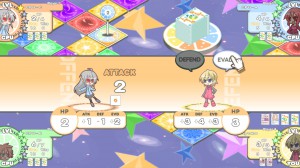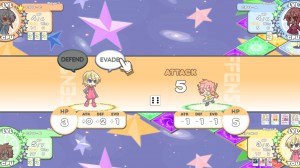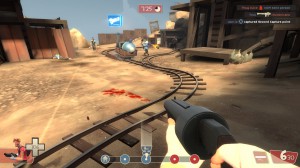Randomness in Video Games
One of the most controversial topics in Team Fortress 2 is that of its random elements, particularly of random critical hits, though random spread was another area of contention for quite some time. Why do so many Team Fortress players think that randomness is an unacceptable part of the game?
It may help to look at other games to gain some perspective. In Magic: the Gathering cards like Mana Clash are reviled for introducing random coin flip elements into the game. More infamously, the Star Wars: TCG by Wizards (not to be confused with the Star Wars: CCG by Decipher) was considered “too random” because it used die rolls for most combat actions. Similarly, imagine a form of hold-em poker where players roll dice at the beginning of each round and all those players who got the highest number get a small fee from the other players. I doubt that you will find a regular poker player who is enthusiastic about playing with this rule. But all of these are card games, where decks are shuffled and so all card draws are random. Why would the inclusion of these random elements upset players so much?
I submit that players are willing to deal with random elements, but only:
1.) If the random elements are clear from the outset.
2.) If the random elements are restricted to only certain types of randomness.
3.) If it is possible to understand how the random elements will affect your chance of success.
There is nothing wrong with randomness in and of itself, especially outside of computer games. If all actions are certain and there is no randomness to the startup, then game necessarily become affairs of long term planning with a great deal of necessary planning before the game even starts. This is the situation with games like Chess or Go, and it is fine to have such games, but not everyone is willing to deal with such intellectual games at all times. Random elements disrupt long term plans and force players to constantly readjust according to the current situation. But at the same time, most people do not want to play games which are determined by nothing but chance, so that random elements when taken too far will be hated by the players.
In the case of the card games I just mentioned players are accustomed and expecting to deal with random draws, and they have an understanding as to how likely it is that certain cards are drawn. In all the games mentioned there are only a certain number of each card per deck, so that when those cards are drawn it is less likely that another will be drawn. In the case of trading card games players have built their decks in a certain way to make it more or less likely to draw certain cards. The randomness has a controlled element which players are comfortable with. Adding coin flips or dice rolls breaks this comfortable environment and makes the arbitrary nature of the random elements more apparent, so these features are not liked.
Let’s take a look at a video game which makes heavy use of random elements: 100% Orange Juice. In this game a whole range of elements from how many spaces you can move, to how many stars you might gain or lose, are determined by the roll of a 6 sided die. For this article we will focus on how random elements affect combat. In combat the attacker rolls a 6 sided die and adds his attack stat. The defender can then choose to defend or evade. Either way the defender rolls a 6 sided die and adds his relevant stat, but damage is calculated differently depending what was chosen. If the defender chose to defend, then he subtracts his result from the attacker’s and takes that much damage, with a minimum of 1 damage. If he chose to evade, then he will take 0 damage if his result exceeds the result of the attacker, and full damage otherwise. Thus evasion is good for dealing with low attacks or when low on health, but defending is better in other situations.
Let’s look at a few examples to see how this works (I am Nanako, the character with blonde hair and a red vest):

Here I am facing an attack of 2 (which had a 1 in 6 chance of occurring with Suguri) and I have increased my stats to +4 defense and +3 evade by use of a card. Therefore even if I roll a 1, I will get at least a 4 on defense or evade, which beats out the attack. So I should evade to avoid taking damage.

In this picture I am facing an attack of 5 (which also had a 1 in 6 chance of occurring). My stats are at their base +2 defense and +1 evade. To successfully evade I will need a roll of 5 or better to avoid damage (a 1 in 3 chance). Otherwise I will take all 5 damage and die. If I defend I will need a roll or 2 or better to reduce the damage to 1 (a 5 in 6 chance), and even if I roll a 1 I will still reduce the damage to 2. So it is probably best to defend, though if I’m feeling gutsy I may still evade in order to take any damage whatsoever.
Note that in both situations I know exactly how likely it was for my opponent to do that much damage, and while I can’t say for sure what will happen when I roll, I know how likely each result is. Note that it is also very obvious that something random is going on here: the opposing character even throws a literal die at me.
Let’s compare this to a scene from Team Fortress 2:

Here I am trying to kill a soldier on the payload cart. He has fired a rocket, and I have know exactly where it will go and have a good idea of the damage it will cause if it will hit. Therefore I plan to dodge and move in for a close shot.
What is unpictured is the fact that the very next rocket that the soldier fired was a critical rocket whose blast killed me instantly. There is no visual indicator that such a thing is about to occur, and there is nothing that tells me the likelihood that a critical rocket will occur. Due to the way that random critical hits depend on damage dealt, it is impossible for me to even be sure of what the percentage was in this commentary. As such I was unprepared for such an event and did nothing to plan for it.
And that’s the problem. Team Fortress isn’t a game that advertises random elements, when random events do occur it is often unclear why they occur and the complexity and skill-based nature of the game (in aiming and maneuvering) make randomness seem unnecessary in the first place. This makes random elements seem strange an alien to the environment of Team Fortress 2. It would be like seeing a poker game decided by a die roll.
Random elements need to be crafted for the type of game that they live in, or players will grow to despise them.
Good article, Gyoku! Yeah, random crits have no place in serious TF2 (except in melee weapons IMO, for reasons I won’t get into). That being said, they’re important for TF2’s long-term sustainability.
Random crits let new players occasionally kill even the best of players. Now, the good player will be furious at this, but the new player will feel good about themselves, even though the good player knows that it was an undeserved kill. Thus, new players are able to get kills as soon as they join the game, which is good, because who wants to keep playing the new game they picked up in which they can’t kill anybody? In TF2, without random crits, new players are worse than useless, and they know it. By giving new players the illusion of skill, Valve eases them into the game.
As a result, I think that random crits should stay enabled in Valve servers. There’s a reason for non-Valve servers, after all. If you’ve reached the point where random crits annoy you, then you only have yourself to blame for playing in a pub server next time you get killed by a wandering crocket
This seems like a good compromise. The problem isn’t so much that random elements exist, it’s that TF2 doesn’t have competent matchmaking. Therefore, high-skill players get matched up with complete noobs, and while the outcome of such a matchup should be easily figured, random crits come in and ruin all plans.
We need to give skilled players a better outlet: competitive matchmaking. Players that are skilled and/or care about winning don’t deserve to be beaten by a dice roll, and players who are unskilled and/or don’t care about winning don’t deserve to beaten constantly by lennyface-spamming pubstompers.
Comp matchmaking, if implemented well, could solve both of the problems at once. Valve should take care with this system, since this update could have the biggest impact on the game not seen since weapon unlocks were introduced.
But it comes with a few issues. It’s very easy for randomess to be well applied in games such as Orange Juice where you can spend time predicting on a level. However, this isn’t the case with TF2. You can’t plan accordingly, where in Orange Juice you have some level of idea what the encounter could be. You don’t have a chance to avoid randomness, which I suppose is some others’ proposal to remove dealing and taking random crits for a client only. In Orange Juice or many Turn Based games, you can choose randomness in such manner. But in a fast-paced anything can change type game like TF2, this randomness is very difficult to implement correctly, as shown with random crits.
It’s a difficult and touchy subject for…well…nearly everyone, so I dunno how to judge it.